by [email protected] | Dec 13, 2023 | Enhancing Culture
Podcast: Play in new window | Download
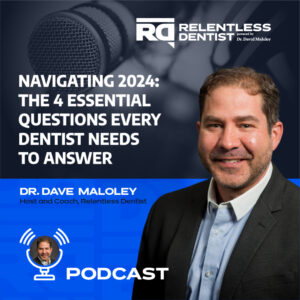 In the ever-evolving and complex world of dental practice management, staying ahead can be challenging. With rising volatility, uncertainty, complexity, and ambiguity in the field, dentists often find themselves at a crossroads, seeking effective strategies to elevate their practice.
In the ever-evolving and complex world of dental practice management, staying ahead can be challenging. With rising volatility, uncertainty, complexity, and ambiguity in the field, dentists often find themselves at a crossroads, seeking effective strategies to elevate their practice.
In this episode, Dr. Dave delves into the complexities dental practice owners will face in 2024. He focuses on how to create a self-managing team and build a high-profit practice amidst uncertainty:
- Adapting to Change: Ready your practice for the unpredictable dynamics of the dental industry in 2024.
- Crucial Questions: Explore key questions to drive effective decision-making and enhance practice management.
- Success Strategies: Identify strategies for developing a self-managing team and optimizing practice profitability.
- Building Resilience: Learn principles and tactics to establish a robust and profitable dental practice.
Tune in now to gain strategies for leading a successful and forward-thinking dental practice.
Take the next step towards transforming your dental practice. Complete the Dentists Ascend Quiz and book your exclusive Freedom Mapping Session with Dr. Dave. Limited to five dedicated dentists, ready for growth in 2024.
Key Quotes:
- “Identifying when you’re in a flow state, where work feels engaging and almost effortless, will significantly enhance your productivity and reduce your stress.”
- “Prioritizing tasks that bring a sense of engagement is a key strategy for maintaining enthusiasm and preventing burnout.”
- “Encouraging self-management within your team will lead to improved job satisfaction, reduced turnover, and a higher quality of patient care.”
- “By focusing on creating a referral-friendly environment, you’re going to increase your patient base and build a community of loyal supporters.”
- “We’re playing an infinite game and it’s about finding harmony and continual growth.”
Featured on the Show:
- People: Tony Robbins, an American author, coach, and motivational speaker, is renowned for his infomercials, seminars, and self-help books, notably “Unlimited Power” and “Awaken the Giant Within.”
- People: Peter Drucker, an Austrian-American management consultant, educator, and author, played a pivotal role in developing the philosophical and practical underpinnings of contemporary management theory through his extensive writings.
- I appreciate your feedback. Let me know what you learned and loved here: [email protected].


by [email protected] | Dec 6, 2023 | Elevating Practice Owner Confidence
Podcast: Play in new window | Download
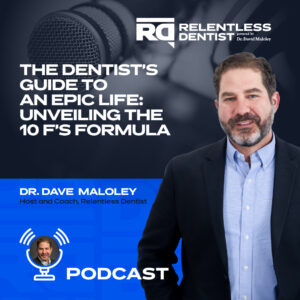 How do you excel in your practice without sacrificing the other aspects of a fulfilling life?
How do you excel in your practice without sacrificing the other aspects of a fulfilling life?
In this podcast, we tackle a critical issue for dental professionals: balancing a thriving dental practice with personal well-being and happiness. It’s a common struggle where long hours and high stress often lead to a life that feels constantly divided between professional demands and personal fulfillment. We explore this using the 10 F’s of an epic life.
These 10 F’s are not just theoretical concepts; they are practical tools for clarity and decision-making. By applying these models, you aim to align professional goals with personal values, simplifying complex decisions and enhancing career and life satisfaction. This approach elevates your practice into a journey of personal growth and meaning, resonating both in and out of the office.
Transform your dental practice and enrich your life with key insights in this episode:
- Revolutionize with Values: See how Faith and Focus can dramatically alter your practice’s direction and decision-making.
- Peak Performance & Well-being: Explore the impact of Flow and Fitness on enhancing your professional efficiency and personal health.
- Growth and Joy in Dentistry: Embrace Fearlessness and Fun, and ignite your professional passion with Fascination.
- Harmony in Wealth and Relationships: Understand the synergy between Friends/Family, Fortune, and Freedom in creating a well-rounded, successful career.
Tune in now to discover strategies for a more powerful and integrated approach to your dental career.
P.S. Reveal the hidden potential in your dental practice. Take the Dentists Ascend Quiz for your customized results.
Key Quotes:
- “If you’re strong in faith and you’re strong in focus, then flow is gonna be much more achievable.”
- “Fitness encompasses not just your physical health but also your emotional and mental well-being.”
- “This approach is about transforming your practice into a journey of personal growth and meaning, leading to success that resonates both in and out of your office.”
- “We’re creating and constructing the epic life that we desire with this framework.”
- “Your journey towards an epic life is not about achieving perfection in every area because it doesn’t exist. We’re playing an infinite game and it’s about finding harmony and continual growth.”
Featured on the Show:
- People: William Butler Yeats, renowned as an Irish poet, dramatist, and prose writer, stands among the most eminent poets who wrote in English during the 20th century.
- I appreciate your feedback. Let me know what you learned and loved here: [email protected].


by [email protected] | Nov 29, 2023 | Elevating Practice Owner Confidence
Podcast: Play in new window | Download
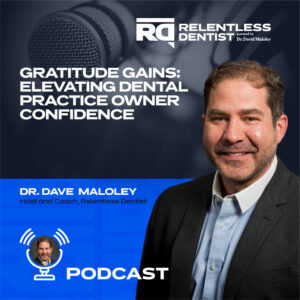 How can you begin incorporating gratitude daily to revolutionize your dental practice?
How can you begin incorporating gratitude daily to revolutionize your dental practice?
In the high-stakes world of dental practice, where every decision counts, embracing gratitude can be your game-changer. This isn’t just about feeling thankful; it’s about leveraging a scientifically proven tool to enhance both your well-being and the success of your practice. Imagine transforming stress into strength and challenges into opportunities with the simple, yet powerful act of gratitude.
In this must-listen episode for dental practice owners, we delve into the transformative power of a next-level gratitude practice:
- Revolutionize Your Mornings: Learn how to supercharge your morning routines and team huddles with gratitude.
- Uncover Health Breakthroughs: Grasp how gratitude profoundly impacts pain control, sleep quality, stress levels, and inflammation.
- Boost Confidence & Drive: Discover immediate strategies to conquer fear and skyrocket motivation, leveraging gratitude to enhance your professional confidence.
Don’t miss out on this opportunity to transform your dental practice. Tune in now to elevate your leadership with the power of gratitude!
P.S. Reveal the hidden potential in your dental practice. Take the Dentists Ascend Quiz for your customized results.
Key Quotes:
- “Practicing gratitude leads to release of dopamine and serotonin.”
- “One study showed that individuals who wrote letters of gratitude, in addition to receiving counseling, recovered more quickly from their mental health concerns compared to those who journaled on negative experiences.”
- “Studies have shown that gratitude practices lead to deeper and healthier sleep patterns.”
- “Gratitude has been found to reduce cortisol levels. That leads to better cardiac functioning and greater resilience to emotional setbacks and negative experiences.”
- “Gratitude practice aids in managing the autonomic nervous system’s functions significantly reducing symptoms of depression and anxiety.”
- “Research has shown that individuals who practice gratitude have lower levels of systemic inflammation.”
Featured on the Show:
- People: Anne Frank, a German-born Jewish girl who kept a diary in which she documented life in hiding under Nazi persecution.
- People: Robert Emmons, an American psychologist and professor at UC Davis.
- Movie: Me, Myself & Irene, a 2000 American slapstick black comedy film directed by the Farrelly brothers, and starring Jim Carrey and Renée Zellweger.
- Place: The Gashouse Restaurant, an American kitchen with a country-chic vibe.
- I appreciate your feedback. Let me know what you learned and loved here: [email protected].


by [email protected] | Nov 22, 2023 | Enjoying Cash Flow
Podcast: Play in new window | Download
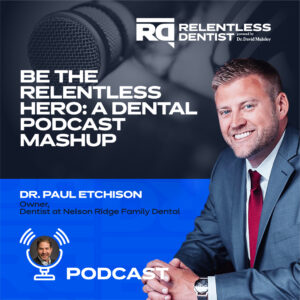 Today’s episode is something special — it’s a bit longer than usual, but every minute is worth it. I’m thrilled to bring you a heart-to-heart with my good friend, Dr. Paul Etchison. We haven’t chatted for over three years, and we’re catching up live, with no agenda, just raw and real conversation. We’ll touch on our usual topics like cash flow, patient experience, and business, but we go deeper, into the struggles and emotional challenges of dental practice. This honest talk is here to inspire you to keep pushing forward in this challenging yet rewarding journey.
Today’s episode is something special — it’s a bit longer than usual, but every minute is worth it. I’m thrilled to bring you a heart-to-heart with my good friend, Dr. Paul Etchison. We haven’t chatted for over three years, and we’re catching up live, with no agenda, just raw and real conversation. We’ll touch on our usual topics like cash flow, patient experience, and business, but we go deeper, into the struggles and emotional challenges of dental practice. This honest talk is here to inspire you to keep pushing forward in this challenging yet rewarding journey.
Dive into a Real and Raw Conversation with Dr. Dave Maloley and Dr. Paul Etchison:
- Identity Shifts Unveiled: Engage with the genuine challenges and triumphs of evolving within the dental profession.
- Practical Growth Strategies: Discover actionable tactics for growing your practice, suitable for both small and large teams.
- Authentic Leadership Insights: Gain invaluable perspectives on guiding your team with sincerity and effectiveness.
- Leveling Up Your Practice: Learn from the experiences of dental leaders who have successfully navigated the journey of professional advancement.
- Direct Dental Wisdom: Access no-nonsense advice for enhancing patient care and optimizing your practice’s efficiency.
This episode is more than a conversation; it’s a deep dive into the realities of dental practice and leadership. Listen now to gain insights that can transform your approach and elevate your dental career.
Tune in today – embrace the insights from The Relentless Dentist Podcast.
Share this episode with your dental community, rate us, and leave a review. Your engagement helps us continue to deliver impactful content for dental professionals.
P.S. Reveal the hidden potential in your dental practice. Take the Dentists Ascend Quiz for your customized results.
Key Quotes:
- “When you’re building culture at scale, you really need that, like, over half 60% 70% that are completely bought into where you’re headed. “
- “You have to have some guidelines, and you have to hold people to them. And you have to be willing to let people go when they’re not meeting expectations.”
- “The empty seat is probably better than the bad apple.”
- “Take the team members personal core values, when you make them the company core values, and the doctor keeps the mission and the vision themselves and sells those two things. Now you’ve got complete buy-in because you’ve given that trust away.”
- “They [staff] want to feel valued, appreciated, and feel like they’re part of something bigger.”
- “I’m a big fan of extraordinary and impossible targets. But when you set impossible targets, whether it be financial targets, days-off targets, it just wakes up the genius and it starts to help you see the possibility.”
Featured on the Show:
- People: Dr. Paul Etchison, Owner/Dentist at Nelson Ridge Family Dental. Co-Founder at Dental Business Mentor, host of Dental Practice Heroes podcast.
- People: Dr. Justin Bhullar, a dentist, speaker, author, coach, and the host of The High Performance Practice podcast.
- People: Robert Greene, an American author of books on strategy, power, and seduction.
- Organization: Academy of General Dentistry, an organization exclusively dedicated to serving the interests and professional needs of the general dentist, providing resources to succeed.
- Book: So Good They Can’t Ignore You: Why Skills Trump Passion in the Quest for Work You Love, Carl Newport
- Movie: Orange County, a 2002 American comedy film starring Colin Hanks and Jack Black.
- Show: Garth Brooks: The Road I’m On, a chronicle of Garth Brooks’ life and career.
- Event: Steve Jobs Commencement Address
- Course: Dental Practice Heroes
- I appreciate your feedback. Let me know what you learned and loved here: [email protected].


by [email protected] | Nov 15, 2023 | Prescriptions for your Practice
Podcast: Play in new window | Download
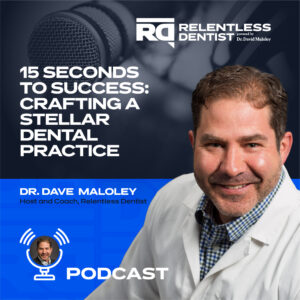 In the day-to-day of dental practice, it’s the consistent, short interactions – those critical 15-second moments – that define your reputation and success. Whether it’s the greeting a patient receives, the comfort provided during a procedure, or the follow-up call after treatment, these instances are where trust is built and loyalty is fostered.
In the day-to-day of dental practice, it’s the consistent, short interactions – those critical 15-second moments – that define your reputation and success. Whether it’s the greeting a patient receives, the comfort provided during a procedure, or the follow-up call after treatment, these instances are where trust is built and loyalty is fostered.
This concept of “moments of truth” isn’t just for leaders to ponder; it’s a powerful tool for the entire team to grasp and act upon. I encourage you to share this with your team. Let it be the starting point for a meaningful discussion on collectively enhancing the patient experience.
Discover the transformative power of ‘Moments of Truth’ in this week’s episode, drawing lessons from legendary leader Jan Carlzon and Scandinavian Airlines’ remarkable turnaround:
- Elevate Patient Interactions: Uncover how every 15-second interaction can be a ‘Moment of Truth’, profoundly enhancing patient loyalty and satisfaction in your dental practice.
- Differentiate with Personalized Care: Learn actionable strategies to make each patient visit memorable, setting your practice apart in today’s competitive landscape.
- Team Empowerment for Excellence: Explore how empowering your staff can turn routine appointments into opportunities for exceptional patient care, driving growth and reputation.
Tune in to “15 Seconds to Success: Crafting a Stellar Dental Practice” for insights on leveraging brief interactions for lasting impact. Transform your practice with a philosophy that appreciates the magic of moments.
Subscribe, rate, review, and share this episode with peers who are just as dedicated to cultivating a high-profit, mission-driven dental practice.
P.S. Reveal the hidden potential in your dental practice. Take the Dentists Ascend Quiz for your customized results.
Key Quotes:
- “Every 15 seconds spent with a customer is a chance to redefine our practice.”
- “Empower your team to create surprise and delight experiences.”
- “Build a practice culture that prizes patient-centric care above all.”
- “Routine dental visits can be trust-building sessions that create loyal patients.”
- “Personalization of the dental experience is key to standing out from the competition.”
- “By recognizing unique patient needs, a practice can turn patients into passionate advocates.”
Featured on the Show:
- People: Jan Carlzon, was CEO of the Scandinavian airline company SAS for more than ten years, famously turning it around.
- Book: Moments of Truth, by Jan Carlzon.
- I appreciate your feedback. Let me know what you learned and loved here: [email protected].


by [email protected] | Nov 8, 2023 | Prescriptions for your Practice
Podcast: Play in new window | Download
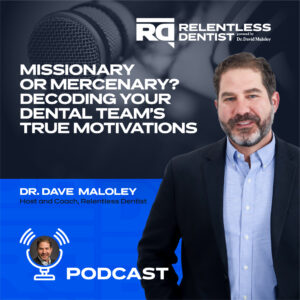 Are you a dental practice owner looking to foster a team culture that’s rooted in passion rather than just profit?
Are you a dental practice owner looking to foster a team culture that’s rooted in passion rather than just profit?
This week, we’re exploring the “Mercenary vs. Missionary” mindset with guidance from John Doerr, the legendary venture capitalist. His insights help us understand the crucial differences between team members who operate out of self-interest and those who are driven by a shared vision and dedication to your practice’s success.
- Delve into Doerr’s perspective on why a missionary-driven team is the cornerstone of long-term success and patient satisfaction.
- Learn actionable steps to inspire a shift in your team’s mindset, leading to improved care, stronger team cohesion, and enhanced practice growth.
- Discover how to identify mercenary traits and strategically transform them into missionary zeal that aligns with your practice’s core values.
For dental practice owners seeking to create a lasting impact and drive genuine success, this episode is your playbook.
Tune in and learn how to lead your team towards a future where dedication and passion are the driving forces.
Subscribe, rate, review, and share this episode with peers who are just as dedicated to cultivating a thriving, mission-driven dental practice.
P.S. Reveal the hidden potential in your dental practice. Take the Dentists Ascend Quiz for your customized results.
Key Quotes:
- Misalignment affects team potential, workloads, patient care, and overall practice success.”
- “Transforming your team from mercenaries to missionaries creates passion and alignment.”
- “Exceptional patient care leads to stronger patient relationships and a thriving dental practice.”
- “Passion can be cultivated from curiosity and leads to consistency of purpose.”
- “The journey from mercenary to missionary mindset requires patience, persistence, and strong leadership.”
Featured on the Show:
- People: John Doerr, an American investor and venture capitalist at Kleiner Perkins in Menlo Park, California.
- People: Mark Cuban, an American billionaire businessman, film producer, investor, and television personality.
- I appreciate your feedback. Let me know what you learned and loved here: [email protected].


by [email protected] | Nov 1, 2023 | Prescriptions for your Practice
Podcast: Play in new window | Download
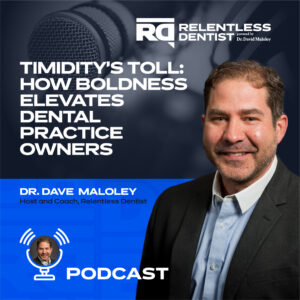 Are you a dental practice owner caught in the inertia of indecision, watching potential growth pass you by? Tune in this week as we delve into the transformative power of boldness in dental practice ownership.
Are you a dental practice owner caught in the inertia of indecision, watching potential growth pass you by? Tune in this week as we delve into the transformative power of boldness in dental practice ownership.
- Understand the crucial difference between “Motion vs Action”
- Learn how a single act of boldness can set off a ripple effect of positive change
- Discover the pitfalls of timidity and how it affects your team and patient relations
If you’re looking to elevate your practice by building an empowered team, attracting a loyal patient base, and boosting profitability, don’t miss this episode! Ready to step up your game? Subscribe, rate, and review. Share this episode with fellow dental professionals who could benefit from a boldness revolution in their practices.
P.S. Reveal the hidden potential in your dental practice. Take the Dentists Ascend Quiz for your customized results.
Key Quotes:
- “Boldness is the key to unlocking a version of you that can effortlessly navigate the complexities of dental practice management.”
- “When you enter action with boldness, you’re not just making a choice, you’re setting a precedent of confidence that ripples through every aspect of your practice.”
- “Hesitation weakens progress; embrace change and innovation with confidence, whether it’s adopting advanced technologies or expanding your services.”
- “Timidity creates internal conflicts and hinders practice growth; boldly confront these obstacles by adopting a mindset of calculated risk-taking.”
- “Each bold action you take as a dental practice owner brings you closer to the confidence and inner peace you seek.”
Featured on the Show:
- People: Robert Greene, an American author of books on strategy, power, and seduction.
- People: Napoleon Hill, an American self-help author who is best known for his book Think and Grow Rich.
- Organization: North American Society of Periodontists, a unique organization of practicing periodontists with a mission to perfect the art and science of building the ideal periodontal practice.
- I appreciate your feedback. Let me know what you learned and loved here: [email protected].


by [email protected] | Oct 25, 2023 | Prescriptions for your Practice
Podcast: Play in new window | Download
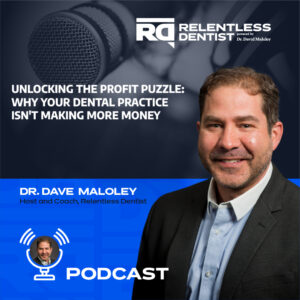 Imagine a dental practice where every action propels you toward greater profitability and personal fulfillment. A place where marketing turns patients into advocates and your innovations set you apart. This isn’t just a dream; it’s within your reach.
Imagine a dental practice where every action propels you toward greater profitability and personal fulfillment. A place where marketing turns patients into advocates and your innovations set you apart. This isn’t just a dream; it’s within your reach.
Our journey begins with a tale of a dental practice drowning in complexity, not debt. Your next steps await, from relationship-building to marketing audits, innovation, and cost reviews. It’s time to create a thriving dental practice, and our podcast is your trusted guide.
What’s In It For You:
- Maximize Patient Loyalty: Inspired by Peter F. Drucker, the Father of Modern Management, learn how to transform first-time visits into lifelong relationships.
- Boost Your Referrals: Uncover Drucker’s principles applied to dental marketing, turning your patients into your biggest advocates.
- Increase Your Profits: Find out how Drucker’s wisdom can help you scrutinize and optimize your costs for a healthier bottom line.
Takeaways:
- Immediate strategies to increase patient retention and referrals, all inspired by Peter F. Drucker.
- Practical tips to optimize your operational costs for higher profits.
Perfect For:
- Dental practice owners who want to unlock higher profits.
- Dentists looking to innovate and optimize their practice.
Tune in to elevate your dental practice’s profitability and patient experience, guided by the timeless wisdom of Peter F. Drucker.
P.S. Reveal the hidden potential in your dental practice. Take the Dentists Ascend Quiz for your customized results.
Key Quotes:
- “Marketing and innovation produce results; all the rest are ‘costs.'”
- “There’s a transformative shift that happens when you move from merely conducting transactions to building relationships.”
- “Effective marketing isn’t just about attracting new patients; it’s about crafting experiences so memorable that patients become promoters of your practice.”
- “Innovation is all about those small, thoughtful changes that can dramatically improve both efficiency and the patient experience.”
- “Every time a patient comes in, they have a choice whether they return or not.”
Featured on the Show:
- People: Peter F. Drucker, Austrian-born American management consultant, educator, and author, whose writings contributed to the philosophical and practical foundations of the modern business corporation.
- I appreciate your feedback. Let me know what you learned and loved here: [email protected].


by [email protected] | Oct 18, 2023 | Prescriptions for your Practice
Podcast: Play in new window | Download
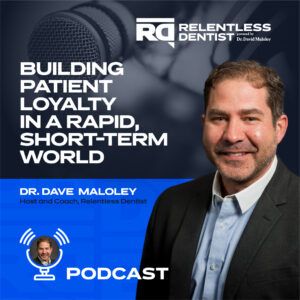 In a world dominated by digital interactions, there’s a powerful reminder that the smallest gestures can create lasting impacts.
In a world dominated by digital interactions, there’s a powerful reminder that the smallest gestures can create lasting impacts.
Imagine the surprise when a dental practice owner realizes that a simple birthday card had a profound impact on a patient. It’s a testament to the significance of small, meaningful moments. As a dental practice owner, you’ll discover how these moments can forge deep emotional connections, build patient loyalty, and elevate your practice to new heights.
While we excel at dental expertise, we also recognize the importance of weaving the philosophy of relationship-building into every aspect of your practice. We’ll delve into the financial perspective of distinguishing between expenses and investments that deepen patient loyalty. Learn how to listen actively, rethink touchpoints, and celebrate the small moments that strengthen the bond with your patients in this podcast designed exclusively for dental practice owners.
Dive into this episode and discover:
- “Hot Fudge Sundae” Experiences: Master the art of creating standout moments that cement patient loyalty in an instant-gratification world.
- Lifetime Value: Unearth the strategy behind enhancing this hidden gem for sustained practice success.
- Handwritten Notes & Snail Mail: Reconnect with the age-old magic that deepens patient ties like no digital method can.
- Trust Building: The underlying foundation that ensures everything else falls into place.
For dental practice owners aiming for not just growth but a legacy, this episode is gold. Tune in now!
P.S. Reveal the hidden potential in your dental practice. Take the Dentists Ascend Quiz for your customized results.
Key Quotes:
- “In the era of instant gratification, dental practices cannot take patient loyalty for granted.”
- “Focusing on patient loyalty and lifetime value in a dental practice is going to bring you some fantastic benefits.”
- “Patient loyalty is not just about clinical excellence. It’s about building emotional connections.”
- “Make memories for your patients. Make it remarkable, worth remarking about.”
- “When a patient receives one of these thoughtful, kind notes, they’re more likely to reciprocate with loyalty, trust, positive word of mouth recommendations.”
- “Patient loyalty is a bedrock upon which your thriving patient-centric dental practice can be built for endurance.”
Featured on the Show:
- I appreciate your feedback. Let me know what you learned and loved here: [email protected].


by [email protected] | Oct 11, 2023 | Prescriptions for your Practice
Podcast: Play in new window | Download
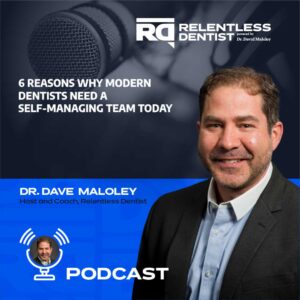 Is your team merely going through the motions or are they on a championship journey?
Is your team merely going through the motions or are they on a championship journey?
I’ve walked the path from the sports field to the dentist’s chair, experiencing the transformative essence of unwavering commitment and accountability. I had the opportunity to work with some of the best athletes in the world. But when I look back on those few years, the most impactful experience was being a part of a back-to-back national champion football team. Amidst the grueling drills and sweat-drenched jerseys, there was an unmistakable element on the field – no one dogged it, and no one made excuses. Why? Because they held each other accountable, pushing each teammate to their limit, play after play, rep after rep.
In this podcast, we’re here to distill the dos and don’ts of cultivating a self-managing dental team inspired by the elite leadership I witnessed in undergrad. We’ll steer clear of pitfalls such as micromanaging, favoritism, ambiguity, neglecting feedback, and complacency. Imagine your dental practice not just as a healthcare clinic, but as an elite sports team, where every procedure and every patient interaction is a chance to win. With the right strategies, your practice can achieve that elite performance you desire.
• Modern Dentistry Deep Dive: Understand how autonomy and self-management are redefining successful practices.
• Harness Technology: Learn how a self-managing team efficiently integrates cutting-edge tools and practices.
• Elevate Patient Experience: Discover the role of an empowered team in ensuring top-tier patient interactions.
• Resilient Practices: Unveil the blueprint for thriving in an ever-changing dental landscape.
• Empowerment = Growth: Grasp why giving your team autonomy is a game-changer for practice growth.
Whether a seasoned pro or a fresh face in dentistry, this episode is crucial for future-proofing your practice. Tune in now!
P.S. Reveal the hidden potential in your dental practice. Take the Dentists Ascend Quiz for your customized results.
Key Quotes:
- “By embracing a system that empowers self-managing teams, you’re going to revitalize energy, your energy, their energy, the energy of the environment.”
- “A self-managing team is well-versed in innovations, ensuring that the practice continually adopts and benefits from the latest advancements.”
- “Operational efficiency. A modern dental practice isn’t getting more simple. It’s getting more complex.”
- “A self-managing team can pivot strategies, develop new services, upgrade services, or refine marketing approaches autonomously.”
- “You want a model that moves up and to the right, no matter what’s happening in the outside world.”
Featured on the Show:
- I appreciate your feedback. Let me know what you learned and loved here: [email protected].


 In the ever-evolving and complex world of dental practice management, staying ahead can be challenging. With rising volatility, uncertainty, complexity, and ambiguity in the field, dentists often find themselves at a crossroads, seeking effective strategies to elevate their practice.
In the ever-evolving and complex world of dental practice management, staying ahead can be challenging. With rising volatility, uncertainty, complexity, and ambiguity in the field, dentists often find themselves at a crossroads, seeking effective strategies to elevate their practice.


 How do you excel in your practice without sacrificing the other aspects of a fulfilling life?
How do you excel in your practice without sacrificing the other aspects of a fulfilling life? How can you begin incorporating gratitude daily to revolutionize your dental practice?
How can you begin incorporating gratitude daily to revolutionize your dental practice? Today’s episode is something special — it’s a bit longer than usual, but every minute is worth it. I’m thrilled to bring you a heart-to-heart with my good friend, Dr. Paul Etchison. We haven’t chatted for over three years, and we’re catching up live, with no agenda, just raw and real conversation. We’ll touch on our usual topics like cash flow, patient experience, and business, but we go deeper, into the struggles and emotional challenges of dental practice. This honest talk is here to inspire you to keep pushing forward in this challenging yet rewarding journey.
Today’s episode is something special — it’s a bit longer than usual, but every minute is worth it. I’m thrilled to bring you a heart-to-heart with my good friend, Dr. Paul Etchison. We haven’t chatted for over three years, and we’re catching up live, with no agenda, just raw and real conversation. We’ll touch on our usual topics like cash flow, patient experience, and business, but we go deeper, into the struggles and emotional challenges of dental practice. This honest talk is here to inspire you to keep pushing forward in this challenging yet rewarding journey. In the day-to-day of dental practice, it’s the consistent, short interactions – those critical 15-second moments – that define your reputation and success. Whether it’s the greeting a patient receives, the comfort provided during a procedure, or the follow-up call after treatment, these instances are where trust is built and loyalty is fostered.
In the day-to-day of dental practice, it’s the consistent, short interactions – those critical 15-second moments – that define your reputation and success. Whether it’s the greeting a patient receives, the comfort provided during a procedure, or the follow-up call after treatment, these instances are where trust is built and loyalty is fostered. Are you a dental practice owner looking to foster a team culture that’s rooted in passion rather than just profit?
Are you a dental practice owner looking to foster a team culture that’s rooted in passion rather than just profit? Are you a dental practice owner caught in the inertia of indecision, watching potential growth pass you by? Tune in this week as we delve into the transformative power of boldness in dental practice ownership.
Are you a dental practice owner caught in the inertia of indecision, watching potential growth pass you by? Tune in this week as we delve into the transformative power of boldness in dental practice ownership. Imagine a dental practice where every action propels you toward greater profitability and personal fulfillment. A place where marketing turns patients into advocates and your innovations set you apart. This isn’t just a dream; it’s within your reach.
Imagine a dental practice where every action propels you toward greater profitability and personal fulfillment. A place where marketing turns patients into advocates and your innovations set you apart. This isn’t just a dream; it’s within your reach.
